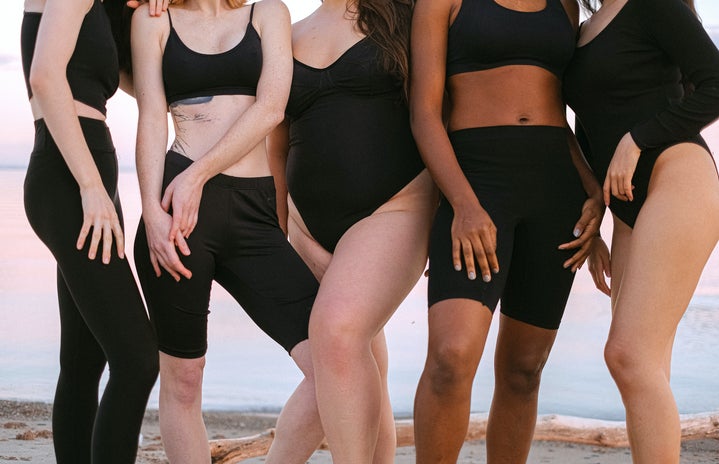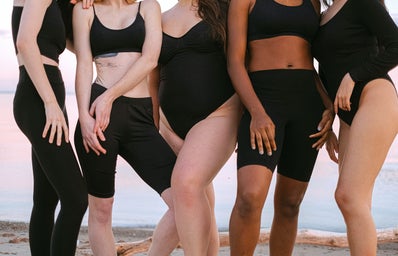TRIGGER WARNING: This article contains my personal story about my eating disorder with topics such as weight loss and calorie counting. Contact the National Eating Disorder Helpline if you or a loved one is struggling with an Eating Disorder.
Chat: Monday-Thursday 9 am-9 pm ET, Friday 9 am -5 pm ET
Call: (800) 931-2237 Monday-Thursday 11 am- 9 pm ET, Friday 11 am-5 pm ET
Text: (800) 931-2237 Monday-Thursday 3pm-6pm ET
*Standard text messaging rates may apply
As a middle schooler, I can recall the numerous times in health class when we were taught about weight management. Being a child who was very diligent and driven in their studies, I took excessive notes on the topic. In this specific class, I can pinpoint the day where I became more fearful of food and what it contained: the day they showed a tape of a young girl being fat-shamed and criticized for her diet. In the video, it showcased how much harm they did to this girl by saying she needed to ‘lose weight’ or that we as the audience ‘did not want to end up like her,’ and how we all need to ‘check for lines located on your neck because those are some early signs of obesity!’ After checking myself in the mirror, I was afraid of what was to come.
Viewing this tape made me hyper-aware of what I was consuming on a daily basis and how the women in my family were absorbed with the idea of being thin as well. Now that I am older and recovering from an eating disorder myself, I am learning to shift my focus away from the nutritional value of food into a new mindset of food being fuel regardless of the food’s makeup. Diet culture or the promotion of exercise solemnly for weight loss in the media can perpetuate numerous types of eating disorders, and I encourage you to stray away from this. In fact, I encourage many to become more aware of how harmful eating disorders can be. They do not need to be glamorized but instead talked about in a way that can prevent widespread eating disorders.
Some common eating disorders consist of anorexia nervosa, bulimia nervosa, binge eating disorder, orthorexia or EDNOS. Usually, treatment is required for many eating disorders, and if left untreated, many health conditions can stem from this act. In just about all eating disorders, there are aspects of body dysmorphia or the constant obsession over one’s image. Some people with body dysmorphia struggle to know what exactly they look like. You do not need to be a specific weight—underweight, a ‘normal’ weight, overweight—to have an eating disorder. They come in all shapes and sizes.
I did not know that I had an eating disorder until March 2020. I had struggled in my past years with tendencies, but I never considered myself to have one because of the common perception of not being ‘thin’ enough to have one. The people that surrounded me in my life always were on diets and afraid of the foods that surrounded them. I felt guilty to eat anything that they did not allow themselves to. I thought that my eating habits were normal, healthy and unharmful, but I later realized that I was depriving my body of fuel. I needed to do something in order to change.
The issue expanded as I entered my freshman year of college. I made excuses to not eat, blaming school work as a reason to not leave my dorm and get food. I was consistently aware of what I was putting in my body. I was consuming less than what a growing baby needs. I gained some of the most painful stomach issues that I have ever encountered and have been dealing with them for almost an entire year now. In recovery, I have taught myself that I am worth more than a number that is on the scale. I have gotten rid of my scale and deleted my calorie-tracking app on my phone. Since then, a lot of my food-related anxiety has decreased.
While I will not blame every influencer in the world for eating disorders, I will challenge sources like TikTok, Instagram, Tumblr and Reddit for promoting them so frequently to be held accountable. Content that is shared on social media can lead to many believing that their bodies are the issue when overall there is a lack of normal, healthy bodies.
Diet culture is harmful when presented to large audiences. It can lead to eating disorders, restriction of food leading to unhealthy eating patterns and it exposes young children to toxic dieting habits. Once diet culture is stripped from our normalized way of thinking, we can finally acknowledge the dangers with its linkage to eating disorders.
I want you to know that if you have ever struggled with an eating disorder of any kind, it is nothing to be ashamed of. We as a society need to do better in promoting love and nourishment to our bodies. Recovery is the best thing that I could have chosen for myself, and as I continue to keep myself on track, I have taught myself that I am so much more than my eating disorder. This is just a part of my story, and while it does not link with every eating disorder today, I want this eating disorder awareness week to get the representation it deserves.
There are aspects that are better left unsaid for the sake of one’s well-being, such as comments revolving around weight or appearance but know that there are ways to support those in need. If you or someone in your life has struggled with an eating disorder, contact the National Eating Disorder Helpline. Know that your body is beautiful and worthy of love. It’s hard, but don’t ever let anyone tell you otherwise.




